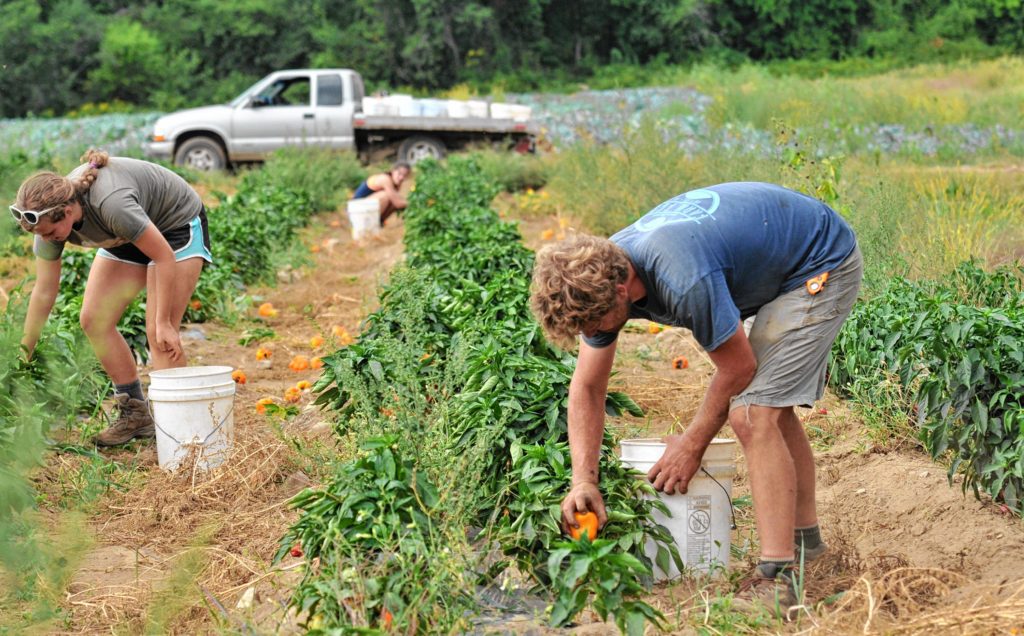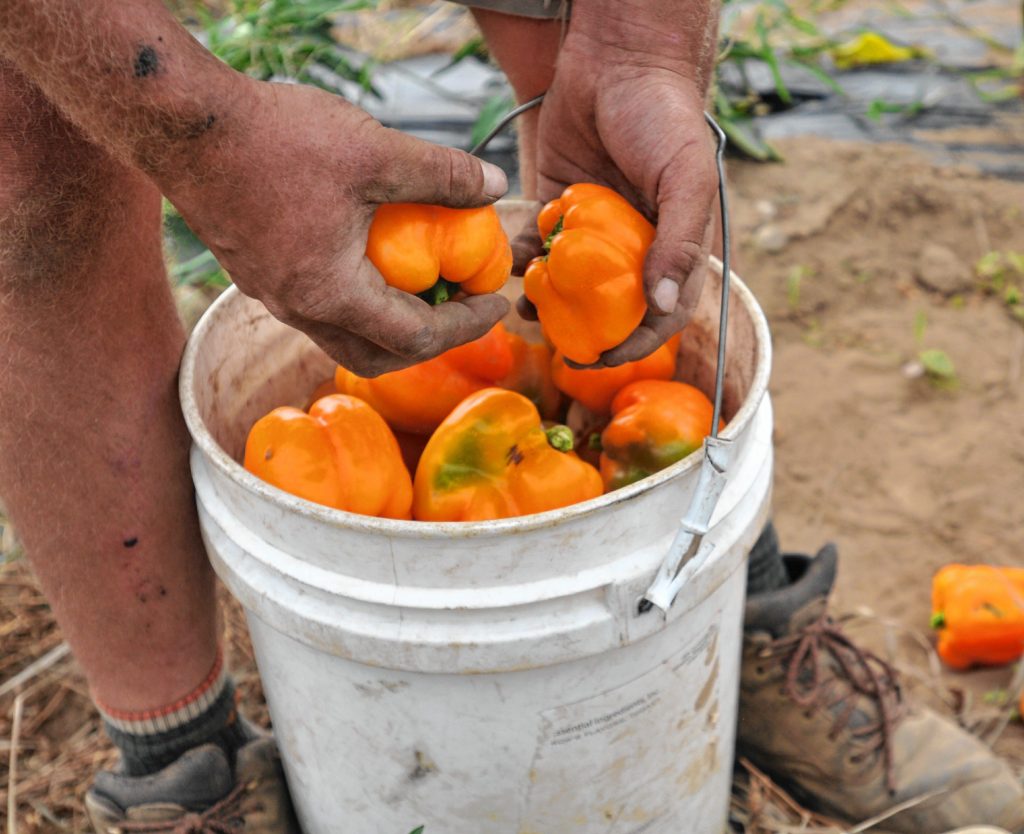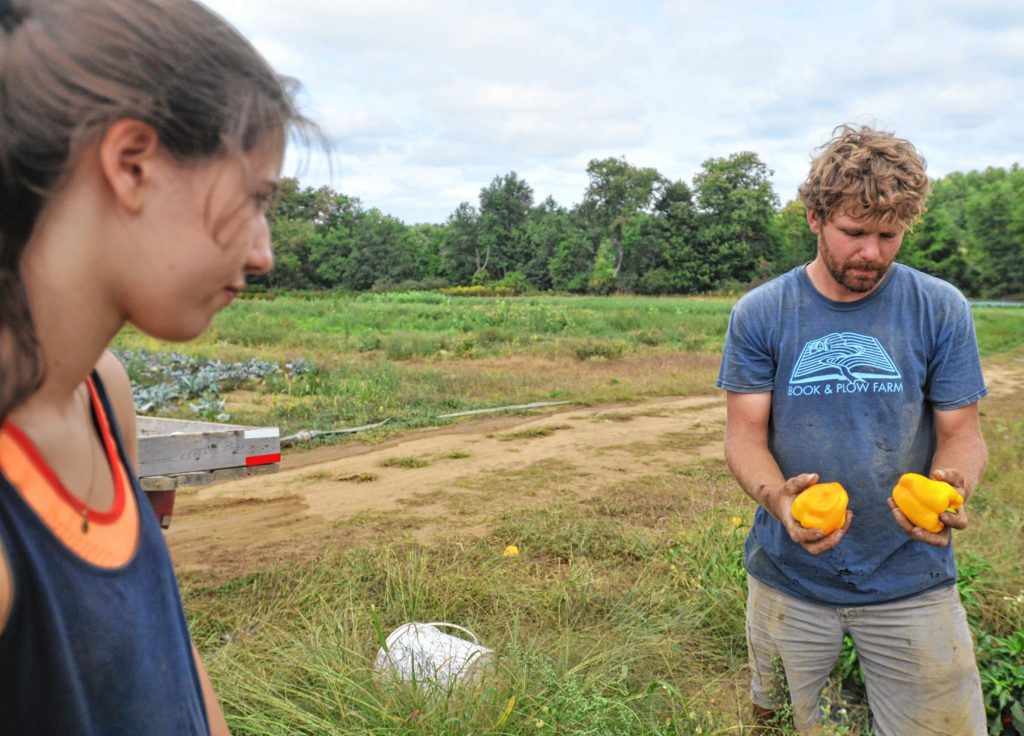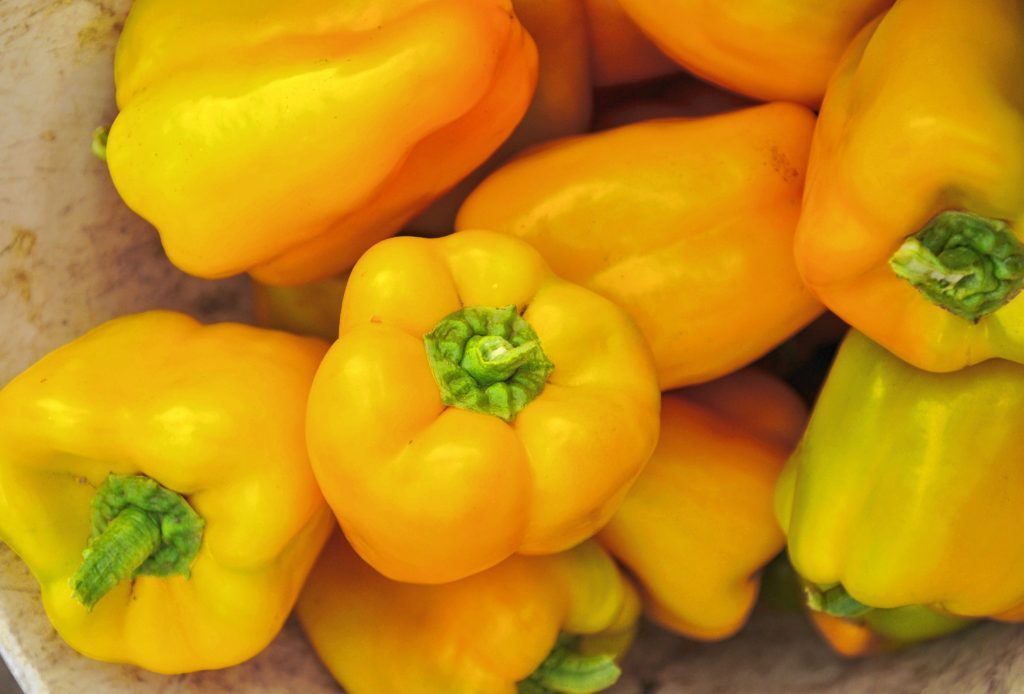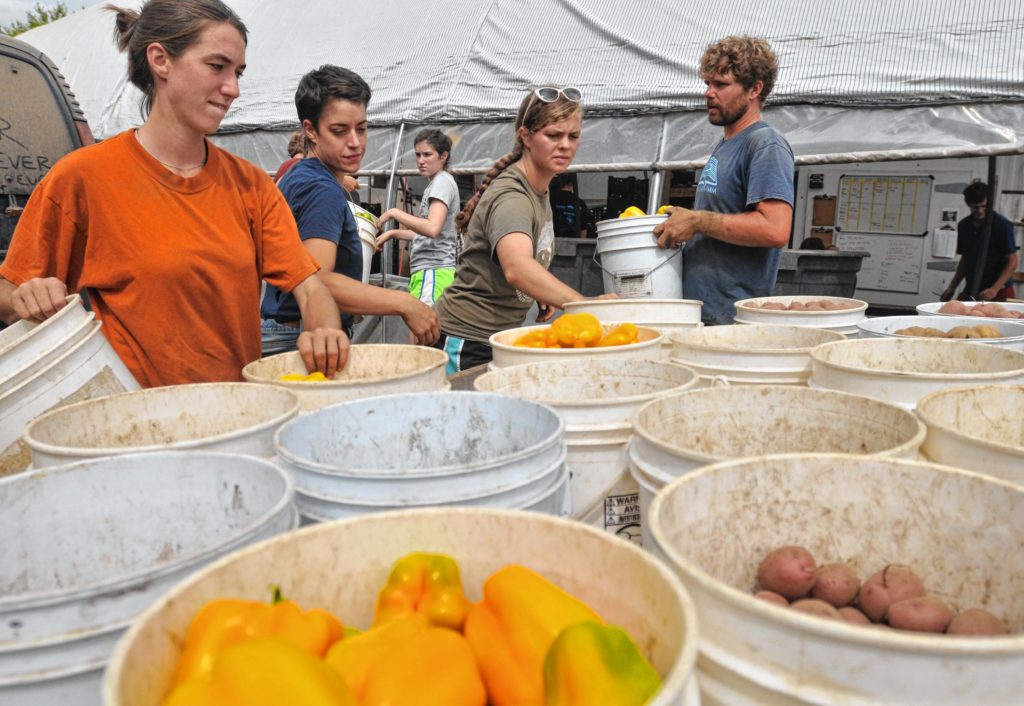I arrive at Book and Plow Farm to find production farmer Tobin Porter-Brown on a tractor, forking a pallet of canvas sacks off a pickup truck. He’s wearing a Book and Plow shirt, khaki shorts and thick boots that will later serve him in better stead than my sandals when we happen across a stretch of poison ivy.
Under a nearby awning, dozens of garlic plants are strung up to dry; red onions sprawl on a plastic sheet. Cultivated flowers speckle a nearby field. It’s an idyllic scene.
But when co-farmer Pete Maclean first got the news that they had been chosen to run Amherst College’s new farm, he called up Porter-Brown in a state between elation and dismay.
“I said, okay, Tobin, let’s go get a beer. Let’s consider all that’s going to come with this,” Maclean recalled. To be selected, they’d run a gauntlet of interviews with a whopping 41 different faculty, staff and students. “It wasn’t a no-brainer.”
Maclean and Porter-Brown are now in their fourth growing season of an endeavor they call “challenging.”
Young farmers themselves are part of a groundswell of interest among college students in sustainable and organic agriculture. Originally, Amherst was pushed to start Book and Plow Farm by an undergraduate proposal.
The college now joins Hampshire College and the University of Massachusetts Amhest in operating student farms that partially supply their dining halls. Mount Holyoke in South Hadley has an organic garden and permaculture program, and Smith College in Northampton recently started a sustainable food academic concentration.
“In the last 10 years, this has just exploded — thinking about where your food comes from,” said Hampshire College farmer Nancy Hanson. “The Pioneer Valley is unique in that we have really good farmland, next to a community that cares about local agriculture.”
College farms are not just helping pioneer new models of providing sustainable, local food that can compete with industrial farms. They’re also on the hook to educate the next generation of farmers and eaters.
To farm their 20 acres, Book and Plow relies almost entirely on student labor. They hired 58 student workers this past year — up from just seven in their first season. They also regularly bring in the college’s sports teams to help with major harvests.
Maclean also runs a smorgasbord of social and educational programs, such as pumpkin-carving, salsa-making, a freshman orientation program, a “weed dating” event, and a “Birds and Breakfast” morning bird-watching series open to the community. A total of 2,300 students have taken part in his programs during the farm’s four years of operation. Given that Amherst enrolls only 1,800 students, that’s a serious feat.
“Pete and Tobin are really seen as rock stars on campus,” said Amherst’s director of sustainability Laura Draucker. “Students love them.”
But the successes have come with struggles. The newest of the Pioneer Valley’s college farms, Book and Plow is also the most independent. Amherst College provided funds for major start-up costs, such as farm equipment, and pays Maclean a fee to do full-time educational programming.
But as an independent contracted farm, the farm leases its land from the college and must pay all its own operating costs. Farm revenues also cover Porter-Brown and Maclean’s salaries.
To meet costs, the farm sells food. Primarily, it sells 30,000 pounds of produce a year to Amherst’s dining hall, Valentine Hall.
“The original mission of the Amherst College farm is it was going to be a production farm,” said Porter-Brown. “It was going to feed the students and satisfy some of [the school’s] sustainability objectives.”
Book and Plow also sells to local businesses, including Woodstar and the Dirty Truth in Northampton, the Pie Bar in Florence, and the Lord Jeffery Inn and Johnny’s Tavern in Amherst.
Finally, through the Community Supported Agriculture (CSA) program by which they supply the dining hall, they also sell vegetables and pork to community members, including but not limited to Amherst faculty and staff.
To stay afloat, most small farms gain higher prices by selling specialty crops or at farmers markets, said Porter-Brown. But because Book and Plow sells its food at wholesale prices to compete with Valentine’s other suppliers, they are at a disadvantage.
“Running a farm at an academic institution, there are certain costs that weren’t on my radar,” he added, including managing student workers. “It adds complexity to an already complex endeavor.”
Book and Plow isn’t the only college farm facing such challenges.
Hampshire College’s farm is a granddaddy among student farms. Begun in the 1970s, it’s one of the oldest small college farms in the country. Indeed, Porter-Brown himself started his own farming career as a student worker at Hampshire, graduating just seven years ago.
Unlike at Book and Plow, 50 percent of the Hampshire farm’s costs are paid by the college, including the lead farmer’s salary. But the farm must come up with the other half.
“It is a challenge to operate a farm with student labor,” said Hanson, the farm’s CSA program manager, because new students must be trained every year, and lack the expertise of permanent workers. “I often say, it’s no way to run a farm. But it’s how to run a student farm. That’s why we’re here.”
Age-old farmers’ banes like weather and insects also play a role. This summer’s severe drought has drained almost dry the pond Hampshire uses for irrigation.
At Book and Plow, the soil is rocky. Plants don’t mind, but equipment may break, stall or fail.
Another challenge for Hampshire, said Hanson, is maintaining its status as an innovator. “Hampshire has been ahead of the curve in the farm movement,” she said. “But how do you stay ahead of the curve?”
Recently, the farm installed a sun-tracking solar panel that fully meets its electricity needs. It’s a step ahead of Hampshire College’s initiative to go completely solar when construction is complete on the school’s new large solar array.
Innovation is a push across the Valley as area colleges seek to help their farms survive and put the region on the map for sustainable agriculture education.
For example, four of the Five Colleges have begun a project with the nonprofit Community Involved in Sustaining Agriculture, in South Deerfield, to procure and use more local food, funded by a grant from the Kendall Foundation.
The intent is to make local purchasing easier to harness the strengths and resources of area farms. Under the plan, a dining hall might buy “hot peppers from Hampshire, tomatoes from Book and Plow, or any of the local farms,” said Draucker.
The drive to use higher-quality, organic food straight from the farm will likely prompt colleges to upgrade their dining halls, said Draucker. Valentine has already started shifting its food preparation practices to incorporate more fresh produce rather than canned, frozen or packaged goods, she said.
The biggest question, she said, is “How do we support local farms, but do that when we can’t afford the prices of local food?”
To do that, Amherst College is thinking about what Draucker calls an associated economics approach. Farm products would be considered not merely for their food value, but also their relationship to the rest of the system — their educational value, for instance, or the worth of farming techniques that maintain healthy soil on Amherst’s land.
UMass is a leader in the sustainable food movement with its much-feted dining hall system recently named “Best Campus Food 2016” by the Princeton Review. To help with costs, its student farm has sought corporate sponsorship. The Big Y supermarket on North King Street in Northampton buys and sells the farm’s vegetables, and also sponsors the farm directly on the condition that the university provide matching funds, said student farm director Amanda Brown.
Brown, like Maclean and Porter-Brown, is a young farmer, having finished her undergraduate degree in 2000 followed by master’s degrees in plant and soil science and in education. “This generation is really wanting to be part of the food revolution in this country,” she said of her students.
Ultimately, each of the area’s college farms has its own model and goals in bringing sustainable agriculture to students. With its larger size and associated agricultural research programs, UMass focuses on the business side of farming.
At Hampshire, “I’m teaching eaters more than I’m teaching farmers,” Hanson said. “I’m hoping when students go out in the world, they’ll support farmers more than they otherwise would.”
At Amherst, the farm isn’t linked to a specific academic program. Instead, the goal is threefold, said Maclean — to connect students to each other, to connect them to themselves, and to connect them to the land.
And to achieve those goals, it helps to connect students with young farmers they can relate to.
“You might get a farmer who’s good on the land, but they might not be good with Beyoncé. They might not be good with gender identity. They might not be good with talking about the realities of eating meat,” said Maclean.
Whatever the difficulties, he added, “I think Tobin and I fit in with this culture.”
Naila Moreira is a writer and poet who often focuses on science, nature and the environment. She teaches science writing at Smith College and is the writer in residence at Forbes Library. She’s on Twitter @nailamoreira.

